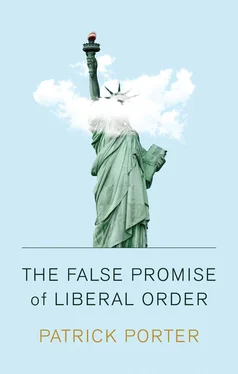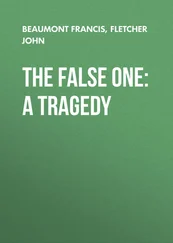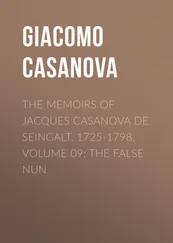Patrick Porter - The False Promise of Liberal Order
Здесь есть возможность читать онлайн «Patrick Porter - The False Promise of Liberal Order» — ознакомительный отрывок электронной книги совершенно бесплатно, а после прочтения отрывка купить полную версию. В некоторых случаях можно слушать аудио, скачать через торрент в формате fb2 и присутствует краткое содержание. Жанр: unrecognised, на английском языке. Описание произведения, (предисловие) а так же отзывы посетителей доступны на портале библиотеки ЛибКат.
- Название:The False Promise of Liberal Order
- Автор:
- Жанр:
- Год:неизвестен
- ISBN:нет данных
- Рейтинг книги:4 / 5. Голосов: 1
-
Избранное:Добавить в избранное
- Отзывы:
-
Ваша оценка:
- 80
- 1
- 2
- 3
- 4
- 5
The False Promise of Liberal Order: краткое содержание, описание и аннотация
Предлагаем к чтению аннотацию, описание, краткое содержание или предисловие (зависит от того, что написал сам автор книги «The False Promise of Liberal Order»). Если вы не нашли необходимую информацию о книге — напишите в комментариях, мы постараемся отыскать её.
The False Promise of Liberal Order
The False Promise of Liberal Order — читать онлайн ознакомительный отрывок
Ниже представлен текст книги, разбитый по страницам. Система сохранения места последней прочитанной страницы, позволяет с удобством читать онлайн бесплатно книгу «The False Promise of Liberal Order», без необходимости каждый раз заново искать на чём Вы остановились. Поставьте закладку, и сможете в любой момент перейти на страницу, на которой закончили чтение.
Интервал:
Закладка:
In all the yearnings for a restored order, and in the closeness of liberal ambition and empire, lies the ghost of President Woodrow Wilson (1913–21). Wilson, it will be recalled, sought to translate victory in the First World War into a new international order. He envisioned a world governed by laws and converging towards democracy, a ‘community of power’. But he, too, typified the tendency of hegemons to set rules for others and play by their own, the better to remain in the ascendancy. The new hegemon would supplant the old and exercise its prerogatives. ‘Let us build a bigger navy than hers’, he said of Britain in 1916, ‘and do what we please.’ 6Like most great powers that boast of their mandate to bring peace to the world, Wilson made war often. Against weaker adversaries from Latin America and the Caribbean to post-Tsarist Russia, his commitment to enlarging liberty was imperial, even when he wasn’t aware of it. When he drafted a speech claiming ‘it shall not lie with the American people to dictate to another what their government shall be’, his secretary of state added in the margin: ‘Haiti, S Domingo, Nicaragua, Panama.’ 7In this respect, America as a great power is unexceptional.
To be clear, the target here is not the minimal ‘baseline’ claim that an American-led order was better than the alternatives. It clearly was. It was better for the world that America became the dominant power, rather than its totalitarian competitors, even if the exercise of that dominance varied in its wisdom. As hegemonies go, America’s was the least bad by a decisive margin. It was a bulwark against twentieth-century totalitarianism; it won more than half the Nobel Laureate prizes, pioneered Jazz, helped rebuild Europe, invented the polio vaccine and took humanity to the moon. American hegemony was obviously less atrocious, and more constructive, than European colonial, Axis or communist empires. Some forget that America created this world through agonizing compromise. Its relative moral superiority, without power politics, cannot explain America’s rise. It cannot prevent its fall. And the belief in one’s indispensability can lead to the fall. Athenian primacy in the ancient Hellenic world was more open and free than Persian autocracy, but that did not prevent its selfdestruction. To confine ourselves to the comfort that, at least, the Pax Americana was better is like retelling the national story with frontier massacres and the Civil War left out.
Rather, the target is a more ambitious proposition, that America exercised hegemony without being imperial; that it oversaw a ‘world historical’ transformation in which rules about sovereignty, human rights and free trade reigned and defined the international system; that the USA voluntarily constrained itself in such a system; that the ‘good things’ that the order produced are attributable to liberal behaviour; and that the sources of the current crisis somehow lie outside the order. This version of liberal order is ahistorical about the nature of power relations in the world. It tells us little about how we got here. Wrong about the past, it is therefore a bad guide for the future.
Even America’s most glorious achievements – with liberal ‘ends’ – were not clean pluses on a balance sheet, made by liberal ‘means’. They relied on a preponderance of power, a preponderance that had brutal foundations. America’s most beneficial achievements were partly wrought by illiberal means, through dark deals, harsh coercion and wars gone wrong that killed millions. No account of US statecraft is adequate without its range of activity. Coups, carpet bombings, blockades and ‘black sites’ were not separate lapses, but were part of the coercive ways of world-ordering. Prosperity generated pollution on an epic scale. Even today, when the USA is keener to limit its liability and is more reluctant to wade ashore into hostile lands, it bombs countries with almost routine frequency. And central to its repertoire are economic sanctions, a polite term for crippling economic punishment, at times even siege and ‘maximum pressure’, inflicted on whole populations and often not with liberating effects. Possibly one-third of the ‘open’ world’s people live in countries under economic warfare of some kind. 8
Conversely, the same America has a conscience. It has held genuinely liberal ideals. Such ideals are a pillar of the American diplomatic mind. For most of those close to power who hold these ideals, this is not a case of ulterior motives, or dressing up narrow material interest in the cloak of universal justice. They are driven by a deeply rooted belief in America’s singular duty to lead the world. But too often, sincerely held ideals had inadvertent and illiberal consequences. In this century, when external restraints were weak and a sense of power and ambition grew, the USA intensified its pursuit of armed supremacy, confident it could see further, and stepped up its effort to spread a system of ever more adventurous global capitalism. From the almost-forgotten capitalist shock therapy visited on post-Soviet Russia, to wars to remake the Greater Middle East, to the loosening of the global financial system, or the incitement of democratic revolution abroad, efforts to spread liberal light have provoked history’s wrath. The very attitude built into the nostalgia, the assurance that one’s international role is vital, that one’s actions are the source of stability and peace, that the dangers of inaction are the only ones worth worrying about, helped lead to disaster, whether in Wall Street, Moscow or Baghdad. To rewrite this history as an ‘arc’ of progress, or an ‘arc’ of anything, is to repeat the hubris that got us here. The arc of history bends toward delusion. 9
There is a poverty in the righteous storytelling that underpins the liberal order idea. The main move of nostalgia is to lament the order’s fall, or call for its revival, while sparing the order any blame for its own plight. Somehow, while it was powerful enough to transform modern life, the Pax Americana remains innocent of its own undoing. It was the fault of other actors, or of leaders who didn’t believe in it enough, or the masses who failed to keep the faith. Its error is to suppose that American power and its liberalism was not only good, but essentially good, that good and wise things are ‘who we are’, while destructive excess is an aberration, and failure must be due to something else. Nostalgia gives the lost order an alibi as wicked populists and a set of ‘isms’ – populism, authoritarianism, protectionism, racism – are to blame. It is also reductionist about the present, offering false binary choices like internationalism versus isolationism, leadership versus quitting, global domination versus isolation in a post-American world. This damages our ability to adapt today under constraints, when prudent statecraft will require some mix of power-projection and retrenchment.
These conceits have come together in the figure of former Vice-President, and presidential candidate, Joseph Biden. ‘This too shall pass’, he declared at the Munich security conference in February 2019, prompting a standing ovation. 10The applause echoed ‘a longing to return to a world order that existed before President Donald Trump starting swinging his wrecking ball’. 11Biden presents Trump as a passing aberration: ‘America is coming back like we used to be. Ethical, straight, telling the truth … supporting our allies. All those good things.’ 12‘Good things’ suggests a cleansing of history. It holds out an assurance that Trump, and the revolt, are exogenous to the order, and thus can be swiftly hurled back into the night without an inquest. Keep the faith, it urges, and await the return of the sleeping king. This attitude is reflected in the Democratic Party more widely, where there is little contest over fresh ideas about foreign policy, and where electability overshadows questions of substance. What if Biden is wrong? What if the order itself was flawed, and drove these revolts? What if the political crisis cannot be undone by one ballot?
Читать дальшеИнтервал:
Закладка:
Похожие книги на «The False Promise of Liberal Order»
Представляем Вашему вниманию похожие книги на «The False Promise of Liberal Order» списком для выбора. Мы отобрали схожую по названию и смыслу литературу в надежде предоставить читателям больше вариантов отыскать новые, интересные, ещё непрочитанные произведения.
Обсуждение, отзывы о книге «The False Promise of Liberal Order» и просто собственные мнения читателей. Оставьте ваши комментарии, напишите, что Вы думаете о произведении, его смысле или главных героях. Укажите что конкретно понравилось, а что нет, и почему Вы так считаете.












